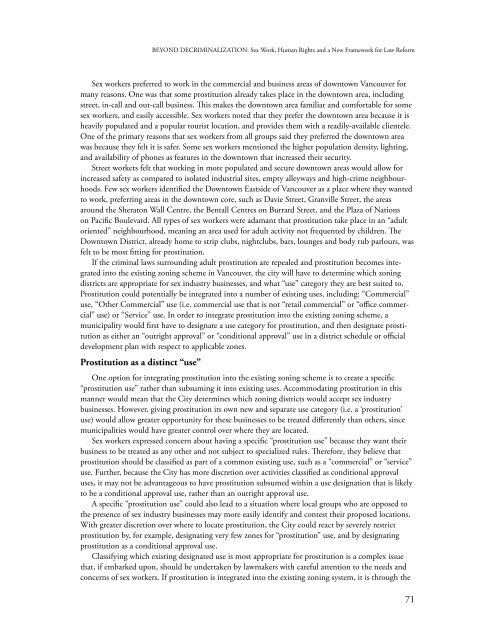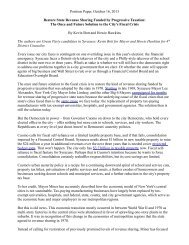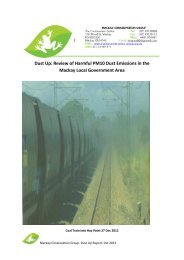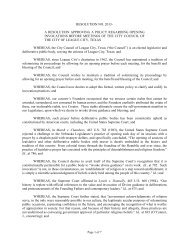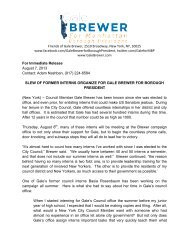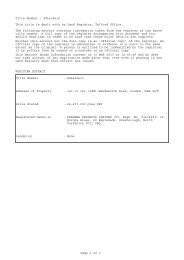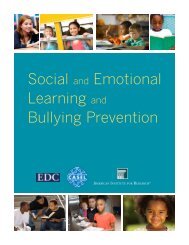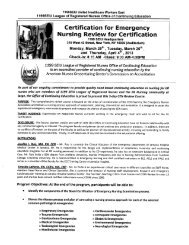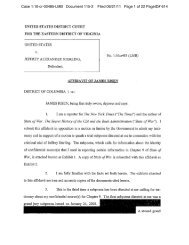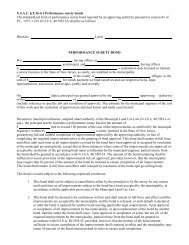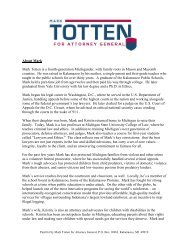Beyond Decriminalization: Sex-work, Human Rights and a New ...
Beyond Decriminalization: Sex-work, Human Rights and a New ...
Beyond Decriminalization: Sex-work, Human Rights and a New ...
- No tags were found...
You also want an ePaper? Increase the reach of your titles
YUMPU automatically turns print PDFs into web optimized ePapers that Google loves.
BEYOND DECRIMINALIZATION: <strong>Sex</strong> Work, <strong>Human</strong> <strong>Rights</strong> <strong>and</strong> a <strong>New</strong> Frame<strong>work</strong> for Law Reform<strong>Sex</strong> <strong>work</strong>ers preferred to <strong>work</strong> in the commercial <strong>and</strong> business areas of downtown Vancouver formany reasons. One was that some prostitution already takes place in the downtown area, includingstreet, in-call <strong>and</strong> out-call business. This makes the downtown area familiar <strong>and</strong> comfortable for somesex <strong>work</strong>ers, <strong>and</strong> easily accessible. <strong>Sex</strong> <strong>work</strong>ers noted that they prefer the downtown area because it isheavily populated <strong>and</strong> a popular tourist location, <strong>and</strong> provides them with a readily-available clientele.One of the primary reasons that sex <strong>work</strong>ers from all groups said they preferred the downtown areawas because they felt it is safer. Some sex <strong>work</strong>ers mentioned the higher population density, lighting,<strong>and</strong> availability of phones as features in the downtown that increased their security.Street <strong>work</strong>ers felt that <strong>work</strong>ing in more populated <strong>and</strong> secure downtown areas would allow forincreased safety as compared to isolated industrial sites, empty alleyways <strong>and</strong> high-crime neighbourhoods.Few sex <strong>work</strong>ers identified the Downtown Eastside of Vancouver as a place where they wantedto <strong>work</strong>, preferring areas in the downtown core, such as Davie Street, Granville Street, the areasaround the Sheraton Wall Centre, the Bentall Centres on Burrard Street, <strong>and</strong> the Plaza of Nationson Pacific Boulevard. All types of sex <strong>work</strong>ers were adamant that prostitution take place in an “adultoriented” neighbourhood, meaning an area used for adult activity not frequented by children. TheDowntown District, already home to strip clubs, nightclubs, bars, lounges <strong>and</strong> body rub parlours, wasfelt to be most fitting for prostitution.If the criminal laws surrounding adult prostitution are repealed <strong>and</strong> prostitution becomes integratedinto the existing zoning scheme in Vancouver, the city will have to determine which zoningdistricts are appropriate for sex industry businesses, <strong>and</strong> what “use” category they are best suited to.Prostitution could potentially be integrated into a number of existing uses, including: “Commercial”use, “Other Commercial” use (i.e. commercial use that is not “retail commercial” or “office commercial”use) or “Service” use. In order to integrate prostitution into the existing zoning scheme, amunicipality would first have to designate a use category for prostitution, <strong>and</strong> then designate prostitutionas either an “outright approval” or “conditional approval” use in a district schedule or officialdevelopment plan with respect to applicable zones.Prostitution as a distinct “use”One option for integrating prostitution into the existing zoning scheme is to create a specific“prostitution use” rather than subsuming it into existing uses. Accommodating prostitution in thismanner would mean that the City determines which zoning districts would accept sex industrybusinesses. However, giving prostitution its own new <strong>and</strong> separate use category (i.e. a ‘prostitution’use) would allow greater opportunity for these businesses to be treated differently than others, sincemunicipalities would have greater control over where they are located.<strong>Sex</strong> <strong>work</strong>ers expressed concern about having a specific “prostitution use” because they want theirbusiness to be treated as any other <strong>and</strong> not subject to specialized rules. Therefore, they believe thatprostitution should be classified as part of a common existing use, such as a “commercial” or “service”use. Further, because the City has more discretion over activities classified as conditional approvaluses, it may not be advantageous to have prostitution subsumed within a use designation that is likelyto be a conditional approval use, rather than an outright approval use.A specific “prostitution use” could also lead to a situation where local groups who are opposed tothe presence of sex industry businesses may more easily identify <strong>and</strong> contest their proposed locations.With greater discretion over where to locate prostitution, the City could react by severely restrictprostitution by, for example, designating very few zones for “prostitution” use, <strong>and</strong> by designatingprostitution as a conditional approval use.Classifying which existing designated use is most appropriate for prostitution is a complex issuethat, if embarked upon, should be undertaken by lawmakers with careful attention to the needs <strong>and</strong>concerns of sex <strong>work</strong>ers. If prostitution is integrated into the existing zoning system, it is through the71


